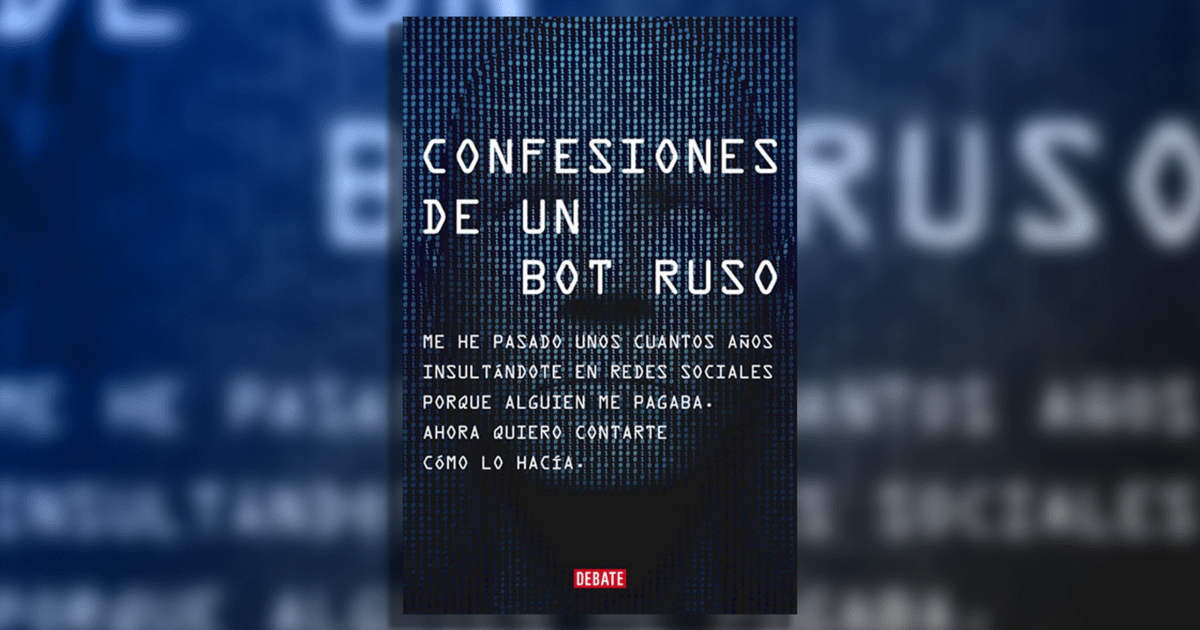“I have spent quite a few years insulting you on social networks because someone paid me. Now I want to tell you how he did it.” This phrase accompanies the title of the book Confessions of a Russian botwritten by a Spanish former employee of an agency dedicated to providing astroturfing services: in other words, dedicated to manipulating public opinion in the digital environment by simulating organic, popular or massive support for an idea, brand or person.
The writer, self-appointed Russian Bot, agreed to answer a questionnaire via email to help digital users detect, understand and avoid harmful practices to which they are exposed when browsing the web. Bot Ruso was the executor of this type of practice… and they paid him to do it.
—How did the idea of capturing your experience in a book come about?
After my resignation, I had a lot of time to reflect. And the balance I made of my time at the agency was clearly negative. And that led me to create a Twitter account with the aim of spreading the great secrets of astroturfing [la manipulación en línea].
Without realizing it, the way of acting @thebotruso it was the same as the alpha troll accounts I had managed during my years in the shadows. Which led to the next step: grabbing the attention of certain journalists.
That was key to getting in touch with Debate (Penguin Random House), who offered me the opportunity to compile all that knowledge in a book. And I thought: ‘Fuck! It’s a fantastic idea.’ I admit that, before that moment, I had not entertained the idea of writing a book. But I am aware that I am a unique testimony.
He thinks that when you leave working in an agency dedicated to astroturfing, you usually hide it. Because it looks very ugly on the curriculum. Although it is an experience that provides a great (and powerful) knowledge that, applied “for good”, opens many doors.
And I’m telling you, I went from watching TV to appearing on it. Hey, not that bad, huh?
“What is the reason you keep your identity hidden?”
-For security reasons. During my experience, I have worked for people with many resources and influences. And I know that if they had known my identity, I would have been in a lot of trouble.
And I am not alone in the world. I have family. And, for me, the safety of mine is something important.
—Before dedicating yourself to executing digital strategies, had you imagined all the work that exists behind a professional troll?
—When I went to work I had a minimal knowledge of how this machinery actually worked. Of course, one knows that on the Internet not everything you read is true, and that there are political parties that use bots or that there are fake reviews. But at no time had I imagined how professionalized disinformation was or the power it has.
—How do you come to work for an agency dedicated to trolling?
—Another coincidence of life: I signed up for an offer published on a very famous job portal in Spain. And immediately I got an answer to summon me to a job interview.
It was a very strange job interview. Where, instead of talking about experience and knowledge, they valued other factors (in a very subtle way), such as the ability to influence or the flexibility of your principles when it comes to a professional matter.
—Which Latin American governments stand out as clients of this type of service?
—Latin America is the playground of those who dedicate themselves to astroturfing. Also, compared to Europe, it works in a very cheeky way. For example, while in Europe bots are being used less and less, in Latam they are going full steam ahead. And campaigns arise where, in addition, the bots are very evident. Exaggeratedly crude.
We have recently been able to see, from a distance, how this type of strategy is capable of mobilizing thousands of people to storm a Congress. But it’s not just Brazil: Argentina, Chile, Panama, the Dominican Republic… and Mexico, of course.
—Which Mexican political parties resort to this practice?
—There is a false belief that far-right parties are the ones that hire this type of services. And the reality is that it is something transversal: from left to right. In Mexico and practically anywhere in the world.
Right now I am not involved in Mexican politics to be able to answer you if one party uses more misinformation than another. But the reality is that there are many parties that use these strategies. Some more obviously than others.
—Are these agencies looking for their clients or do the clients look for these agencies?
—Clients have a problem, and it is the agency that, based on a previous network of contacts, reaches the client with the ‘magic elixir’.
It’s something like in the movies: a character has an existential problem and the Devil appears with a contract that will save him from all problems for a small price.
—Bots, trolls, astroturfing… Why is it important for people to know the meanings of these concepts?
—Ignorance is the vulnerability that these agencies take advantage of to execute this type of digital strategies.
For example, in Europe we are very angry [desconfiados] with the bots. We know how to identify them more or less easily and, therefore, their effectiveness is very low. But there are many people who do not know that there are offices with dozens of employees who manage dozens of accounts with the aim of creating opinion states. And that is where we “fall” as nerds (inexperienced or unwary).
—What should we know about astroturfing?
—The first thing we must take into account is that there are political personalities, businessmen, organizations and others with a great interest in making us go through hoops and with very few scruples. And that they are capable of practically anything in order to achieve their goal: be it getting your vote, sinking the competition or exalting a certain idea.
—Who usually resort to this practice?
“These are profitable organizations. Whether it is a political party (which receives a share of public funds), a national or international company, a government, a soccer team, an NGO [organización no gubernamental]…
It is a service with a high price. So it requires having a good budget to be able to invest in this.
—What are the benefits of those who execute it?
—Achieve the objective. Whether it’s saving your ass from a corruption charge or winning an election.
“What precautions should we take?”
—It’s sad, but we must learn to be more suspicious.
—How much does a bot earn?
—In Spain, the salary of a bot is around 1,100 euros (about 22,000 Mexican pesos). So that you can take a reference, the minimum interprofessional salary, in Spain, is 1,000 euros. And the usual thing, in cities like Madrid or Barcelona, is to pay a rent between 700 and 1,000 euros.
—Do you have any estimate of the annual profits produced by this trolling business?
—Accounting for how much astroturfing can generate is complicated. But there are annual contracts that have a value of around half a million euros, and others that exceed one million.
—How are fake news created and what are they for?
—It is a job much more related to sociology than to the digital aspect. To create fake news, it is essential to know the point of pain and the motivation of the target audience, as well as the way of communicating and the channels they use the most (to create the message and know how to spread it).
—In electoral times, what should people know about the practices you describe in your book?
—In the pre-election period is when the strongest astroturfing strategies begin. When we find controversial news or information, we must ensure its veracity. For this reason, it is interesting to verify that several more or less “recognized” media have echoed the information. And, when it comes to statements, make sure that we are not facing a video edited (manipulated) in a biased way with the aim of implying something other than the speech.
But come on, if they are read Confessions of a Russian bot you will find many more tools to learn to consume information and not fall into the trap.
















